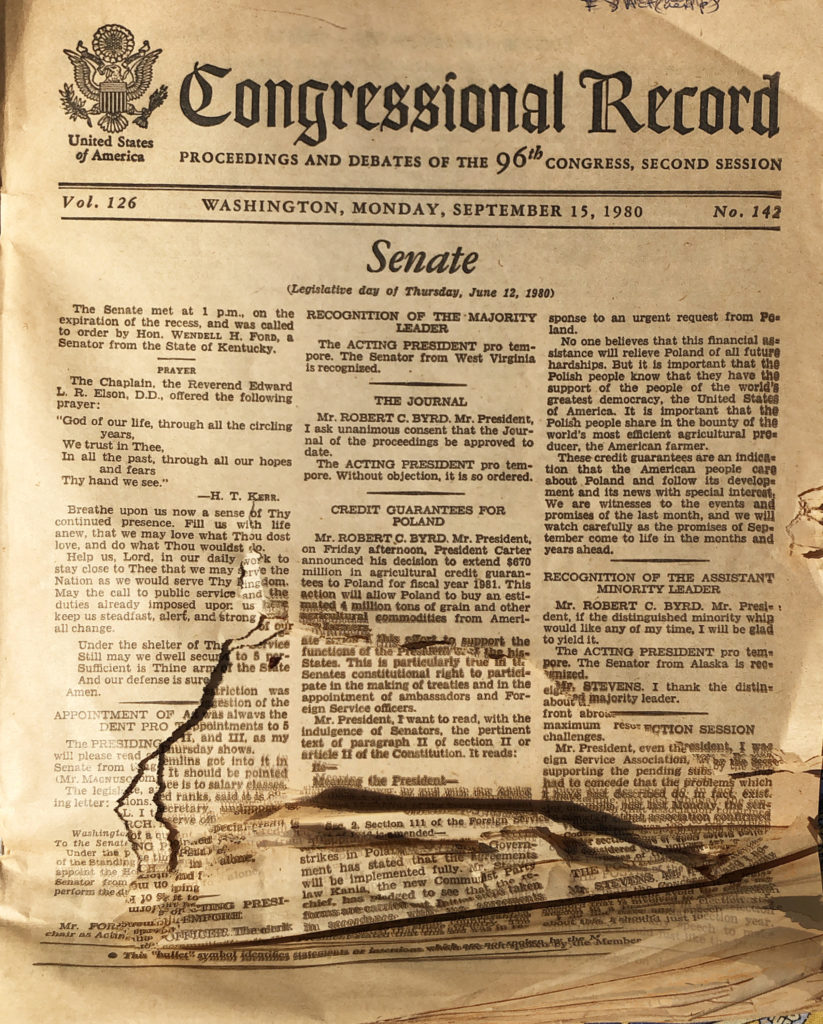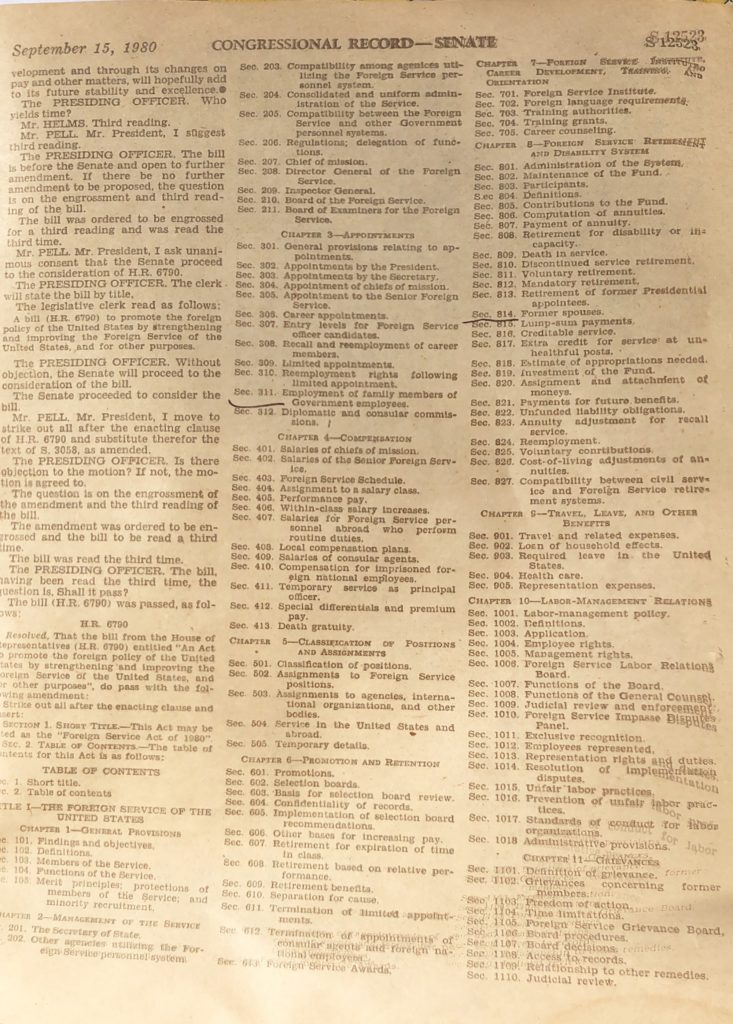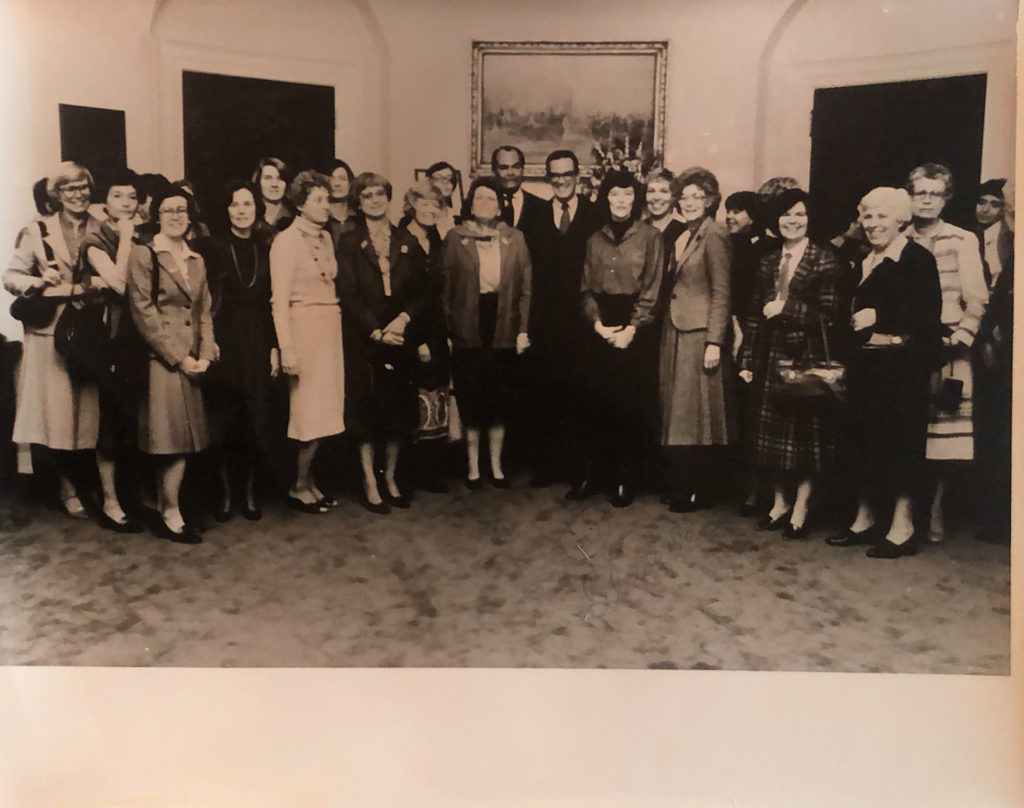AAFSW lobbied Congress to grant pension rights to the divorced spouses of Foreign Service Officers who had served more than 10 years overseas. AAFSW and the FLO worked very hard on this successful campaign. However, in the beginning, it was not retroactive, which meant that the divorced women who had fought for these rights were not themselves covered, because they had been divorced before the provisions were put in place. It took another seven years to achieve coverage for the older women.
Pension Rights and Divorce
Before 1980, women divorced from diplomats found themselves without pensions, health insurance or social security. Foreign Service wives lobbied to have some health and retirement benefits for divorces included in the 1980 Foreign Service Act.
Excerpt from Washington Post article “Rights of Divorce”, April 14, 1985, no author listed
S014_01_1979_April-Introduced-Bill-Would-Mandate-Annuities_AAFSW-newsletter
S014_06_1980_Nov_Pension-Sharing-A-Reality_AAFSW-NewsletterThe next thing, as far as divorce is concerned, was Survivor Annuities and Pro Rata Share. The divorce really seemed to be on the upswing in the Foreign Service.
Lesley Dorman
S014_02_1979_May-Dorman-testifies-for-Congressional-Committee_AAFSW-newsletter“’While life in the foreign service is stimulating and has undeniable rewards of personal growth, travel and international friendship, the dark side is seldom recognized,” testified Lesley Dorman, president of the Association of American Foreign Service Women. “We experience the alienation of culture shock, the isolation of language inadequacy, the hazards of rigorous climate and endemic disease, the trials of evacuations and the pervasive fear of terrorism.’”
“And in recent years, she and others testified, the foreign service spouses have been experiencing an even more threatening phenomenon: the changing American life style, with its high divorce rate, which has left hundreds of thousands of middle-aged women in economic and emotional chaos. The foreign service wife who has spent most of her career years overseas at her husband’s side, unable to earn money independently, is in a particularly tough economic situation, according to Dorman.”
Excerpt from Washington Post article “Foreign Service Wives: What Price ‘Service’?”, July 27, 1979, author: Judy Mann
S014_03_1979_Sept-AAFSW-Goes-to-the-Hill_AAFSW-NewsletterWell, it was opportune, and I covered quite a wide spectrum in my brief. It wasn’t just on Survivor Annuities and Pro Rata Sharing. It was employment opportunities and a general going forward for the spouse. And then, after that, Patricia Ryan testified with me, and Marcia Curran, both of them. Marcia Curran, of course, later on, became a Director of FLO. Marcia testified. This was before the Post Office and Civil Service Committee of the House with Pat Schroeder in the Chair and Dante Fascell, who is now Chairman of the Foreign Affairs Committee in the House.
Lesley Dorman
One of the things that had happened during the decade of the ‘70s in addition to the ‘72 Directive, was the institution of no-fault divorce. This had had the unintended effect of creating a situation in which women, after marriages of many years, no longer had any leverage to prevent an unwanted divorce or to protect herself in any way from the financial affects of that.
Patty Ryan
S014_04_1980_Jan-AAFSW-testifies-again_AAFSW-newsletterI remember one woman saying she’d gone into the Legal Department to discuss what was going on, and the first thing they said to her was, “Well your husband’s leaving you? Well, let me have your diplomatic passport back, please, right now.” And that was as far as the State Department . . . . And that was quite appropriate, though heartless. I don’t fault the State Department in that. What I fault is the fact that the expectation had been raised. In fact, we did have some kind of a quasi-formal role in what went on overseas and we all knew that we had spent many hours doing things that we wouldn’t necessarily have done had our husbands not had the jobs that they had.
Patty Ryan
But nobody was prepared for the fact that suddenly at 45, 50, 55, these women would find themselves out on the sidewalk with maybe half a house as their lifetime economic equity
Patty Ryan
While we had started out making a case for the fact that women did so much overseas, it soon became apparent that our best strategy was to say, well whatever the wife did overseas, even if she didn’t do a thing that was useful to the U.S. government overseas, the fact is that, by the very situation of her being there, it absolutely precluded any opportunity that any woman would have to create any pension or benefits for herself on her own. If you could work, it was part-time. It was in this post and not in that post, it was in pesos and kroner and sometimes people were paid poorly for things that they would do simply because they were a teacher and they got maybe $2,000 a year to do it, but they wanted to be doing something. Or many people volunteered and did things. But you knew that whatever the situation was, the only thing that you knew for sure was that they couldn’t have gotten a pension for themselves. They had no real viable alternative. You could say that somebody chose to be a wife and they chose to stay at home with their children and so forth. And at least in the Foreign Service, you could say that even if you didn’t choose to do things, there wasn’t any alternative.
Patty Ryan
Like a growing number of Foreign Service wives over age 40 who marriages, after 20 or 30 years, end in divorce, she had to her credit countless hours of volunteer and representational work abroad but no paid job history”
Unlike women whose husbands were in non-diplomatic fields, Foreign Service wives were not permitted to pursue careers or have jobs during overseas assignments with their husbands. Like it or not, their husbands’ careers were their careers. They and indeed the entire family were “good will ambassadors” expected by the State Department to devote time, talents and as sometimes was the case, no few tears in the name of God, country and patriotism
Excerpt from Washington Post article “Divorce, Foreign Service Style. Coping with the Ex-Wives’ Future Shock”, June 23, 1980, author: Donnie Radcliffe
S014_05_1980_MayJune_Divorce_AAFSW-Newsletter
I began to get these divorced wives together to find out what their specific problems and their approaches and have them help each other. There is another peculiarity in the Foreign Service which is that not only did women come back from overseas to go to jurisdictions where the Foreign Service life was little known or understood, we also had many foreign wives who would be divorced while living in the United States who had very little understanding even if they were well-educated, of what the American legal system would provide. So women from European countries who would assume that they would be treated in the same equitable way that they would in an advanced industrial country in Europe, who then discovered that, no. In effect, they said, “No, kid, you’re on your own. Go out and get a job,” which at 45 is easier said than done. Any professional qualifications you might have had in past years are very out of date. The interim work that you might have done, its worth is rated as valueless by our society.
Patty Ryan

Patty Ryan’s personal copy of the Foreign Service Act of 1980 
Patty Ryan’s personal copy of the Foreign Service Act of 1980, Sec. 311 and Sec. 814 underlined in ink
Around the same time, the Department was working on the Foreign Service Act and the Foreign Service Act of January 1980 came into effect. The AAFSW stalwarts at that time Patty Ryan and Lesley Dorman were successful in including language in the Foreign Service Act, which institutionalized the Family Liaison Office in the Foreign Service Act saying that the Secretary shall have an office created to facilitate the employment of spouses; it wasn’t called a skills bank but they were to devise a method of tabulating and looking at the skills of spouses to facilitate employment. So that was written into the Foreign Service Act. At the same time AAFSW also was able to lobby and have written in the Foreign Service Act pension rights for divorced spouses
Faye Barnes
